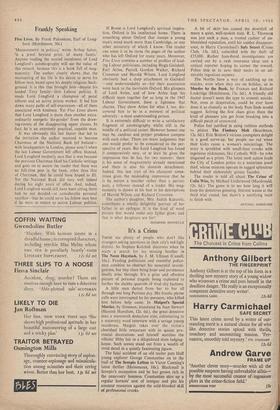It's a Crime
THERE are plenty of people who don't like strangers asking questions in their city's red-light district. So Stephen Kolchak discovers when he starts a search for his missing brother in The Neon Haystack, by J. M. Ullman (Cassell, 16s.). Feuding politicians and resentful police- men combine to obstruct his mournful investi- gations, but tiny clues bring hope and persistence finally wins through. It's a grim and effective picture of personal tragedy being exploited to further the shabby quarrels of rival city factions.
A little man darted from bar to bar all through one long Parisian day. His frantic phone calls were interrupted by his•pursuers, who killed him before help came. In Maigret's Special Murder, by Simenon, translated by Jean Stewart (Hamish Hamilton, 12s. 6d.), the great detective does a mammoth deduction stint, culminating in a maternity ward interview with a savage young murderess. Maigret takes over the victim's cherished little restaurant with its quaint pro- vincial decorations and himself searches the villains' filthy lair in a dilapidated slum lodging- house. Such scenes stand out from a wealth of vivid detail in a quietly fascinating jigsaw.
The fatal accident of an old waiter puts bluff young explorer George Constantine on to the trail of The Scorpio Letters in Victor Canning's latest thriller (Heinemann, 18s.). Blackmail is Scorpio's occupation and he had grown rich in the unsavoury business. Constantine stirs up a regular hornets' nest of intrigue and pits his amateur resources against the cold-blooded skill of professional crooks. A bit of skirt has caused the downfall of many a quiet, well-spoken man. R. L. Thornton was just such a man, a trusted cashier of un- blemished reputation, until his sudden disappear- ance, in Harry Carmichael's Safe Secret (Crime Club, 13s. 6d.), coincided with the theft of £35,000. Rather ham-fisted investigations are carried out by a rash insurance chap and a cynical reporter hoping to corner the reward. Police step in to save their necks in an ad- mirably ingenious mystery.
The Norths have a way of catching up on murder, even when they are on holiday, as in Murder by the Book, by Frances and Richard Lockridge (Hutchinson, 13s. 6d.). A friendly old doctor doesn't seem the type to commit suicide. Nor, even in desperation, could he ever have done it as clumsily as the body Pam finds would suggest. Solving the first clues gives them the kind of pleasure you get from breaking into a difficult patch of crossword.
Police feel justified in using ruthless methods to pinion The Finsbury Mob (Boardman, 12s. 6d.). Eric Bruton's vicious youngsters delight in a good carve-up, but people see red wheri their kicks cause a woman's miscarriage. The story is sprinkled with small-time crooks with ingenious nicknames, like Catholic Will—he robs disguised as a priest. The latest mob action leads the City of London police to a notorious jewel thief, whose minions operate in ragged splendour behind their elaborately greasy facades.
The reader is told all about The Crime of Colin Wise, by Michael Underwood (Macdonald, 12s. 6d.). The game is to see how long it will keep the detectives guessing. Interest wanes at the third trial round, but there's a satisfying twist to finish with.
ANTONIA SANDFORD






































 Previous page
Previous page